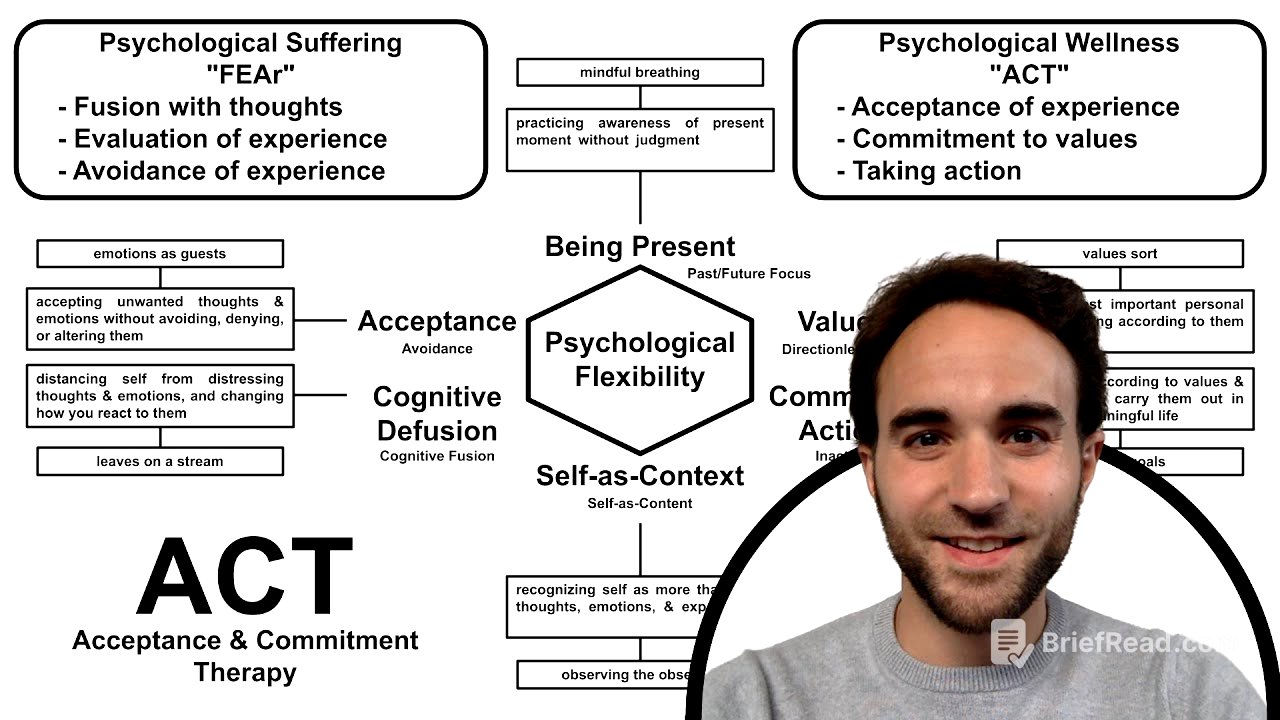TLDR;
This video provides an overview of Acceptance and Commitment Therapy (ACT), a psychotherapy approach aimed at enhancing psychological flexibility. ACT addresses suffering by targeting fear, fusion with thoughts, evaluation of experiences, and avoidance. The core of ACT involves six key processes: acceptance, cognitive defusion, being present, self as context, values, and committed action. By understanding and applying these processes, individuals can better adapt to life's challenges and live more meaningful lives.
- ACT enhances psychological flexibility through mindfulness and behavioral strategies.
- It targets suffering caused by fear, fusion with thoughts, negative evaluations, and avoidance.
- The six core processes are acceptance, cognitive defusion, being present, self as context, values, and committed action.
Introduction to Acceptance and Commitment Therapy (ACT) [0:00]
The video introduces Acceptance and Commitment Therapy (ACT) as a psychotherapy method that employs mindfulness and behavioral strategies to foster psychological flexibility. ACT is beneficial for treating various mental health conditions and alleviating suffering related to chronic pain, illness, and other persistent life challenges. The discussion will cover the fundamental assumptions of ACT and its core therapeutic processes.
Basic Assumptions of ACT [0:26]
ACT is grounded in the idea that psychological suffering is a common human experience, often intensified by our relationship with internal experiences, particularly thoughts and emotions. Suffering arises from several key factors: fusion with thoughts (overvaluing thoughts), evaluation of experience (making judgments and self-criticism), and avoidance of experience (suppressing thoughts and emotions, and avoiding beneficial behaviors). ACT proposes that acceptance, commitment to values, and action are the solutions to reduce suffering.
Core Processes in ACT [1:15]
The primary goal of ACT is to enhance psychological flexibility, which is the ability to adapt to changing circumstances and respond effectively. This is achieved through six core processes: acceptance, cognitive defusion, being present, self as context, values, and committed action. Each of these processes plays a crucial role in helping individuals navigate their internal experiences and external challenges more effectively.
Acceptance [1:39]
Acceptance involves acknowledging unwanted thoughts and emotions without trying to avoid, deny, or change them. The opposite of acceptance is avoidance. An exercise to promote acceptance is "emotions as guests," where one imagines their mind as a house and emotions as temporary visitors. This exercise teaches that emotions are transient and do not need to be suppressed.
Cognitive Defusion [2:09]
Cognitive defusion is about creating distance from distressing thoughts and emotions, altering how one reacts to them, with cognitive fusion being the opposite. The "leaves on a stream" exercise helps promote defusion by visualizing thoughts as leaves floating on a stream, allowing them to pass without causing distress.
Being Present [2:32]
Being present involves practicing awareness of the current moment without judgment, contrasting with ruminating on the past or worrying about the future. Mindfulness exercises, such as mindful breathing, help focus attention on the breath, promoting presence.
Self as Context [2:49]
Self as context means recognizing oneself as more than just thoughts, emotions, and experiences, rather than defining oneself solely by these contents. The "observing the observer" exercise encourages individuals to bring attention to their thoughts and question who is noticing these thoughts, fostering a sense of self separate from those thoughts.
Values [3:18]
Values involve identifying one's most important personal values and aligning life accordingly, as opposed to living without direction. A values sort exercise helps clarify values by sorting a list of commonly held values based on their importance to the individual.
Committed Action [3:37]
Committed action includes setting goals based on personal values and taking steps to achieve them, leading to a meaningful life, in contrast to inaction. SMART goals (Specific, Measurable, Achievable, Relevant, Time-bound) are a strategy for effective goal setting, helping individuals take clear steps toward their values.









